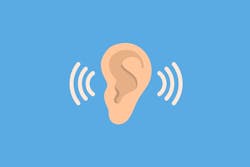I’ve mentioned before that the environment I am trying to cultivate at our shops is summarized in the phrase “a culture of care.” We want this care to extend in at least 4 directions:
- To our team and how we give people opportunities to advance and develop their skills.
- To our customers via empathy and creating an effortless experience for them.
- To our communities via generosity with our time and revenue.
- To the vehicles we repair via high quality craftsmanship.
To develop care in all of those directions requires many skills, but a core one that encompasses all four directions is listening.
Listening is the one skill I wish I could instantly impart to all my team members, friends and family. It is the one ability that opens up so many other possibilities. It is the skill most needed for developing a culture of care.
I recently read an article where the writer said that listening is a whole different way of thinking and, in fact, can be a whole different way of living. Listening is a skill that. if mastered. will literally make you a better person and enrich every relationship in your life. Every. Single. One. Imagine that for a moment. Imagine that difficult relationship that you are encountering right now. That son who just won’t do what you ask. That employee that seems to give you more trouble and you keep wondering if it’s worth keeping him around. The customer who won’t stop going on and on about their personal life when all you want to do is fix their car. Every. Single. One.
Now, listening is no cure all. It won’t instantly resolve every knotty problem you face. But it can help. It is a great starting point, if nothing else.
Let’s look at what not listening looks like, just so we’re clear on what it isn’t. Here are some common misconceptions about listening:
- Giving advice, making suggestions, providing solutions. This listening roadblock draws on the expertise of the one making the suggestion and can often begin with subtle non-listening phrases like, “What I would do is…” or, “You should…” We have a strict “no should-ing on each other” rule in our business. It can get even more subtle, though, when we ask leading questions like, “Have you thought of…” or, “What if you…” These are not really questions that lend themselves to good listening. This is advice shrouded in a question.
- Agreeing, approving, praising. Surprisingly, approval is not a good listening practice. It can imply an uneven power structure in the relationship, as though I am pronouncing from a place of superiority that you are correct. Even this can stop the flow of communication and stop the other person from discovering what they really think. They do not need us to approve. They need someone who can genuinely care for them by creating a space, holding a place for them to process through what they really think and arrive at their own conclusions. “I agree” and “That sure seems right to me” are a couple ways we inadvertently shut someone down through approving. Let them argue all sides of a decision and come to their own conclusions.
- Reassuring, sympathizing, consoling. Our desire is to make someone feel better. What could be wrong with that? Nothing—but it’s not listening. It stops the free flow of communication. We often so badly want to help someone out of their pain that we just go to this one. It is a favorite of mothers (aka “smothers”) and sometimes needed. However, part of maturing is learning how to make peace with, learn from and grow through pain. If we eliminate pain too quickly, we will miss out on certain things that only pain can teach us. So we say things like, “Everything is going to work out fine” or, “You’ll look back on this and laugh.”
Author Brene Brown says that any statement after someone has expressed pain that starts with, “Well, at least…” is not good listening or empathetic. It minimizes what they are feeling and does not allow them to process it any further.
Keep in mind that the above does not apply when we are training someone on how to do something, which requires a more direct approach. What we’re talking about here is how to cultivate active listening so the people around you (customers and coworkers) feel heard and cared for personally.
Listening well is a skill that can only be developed by intentionally practicing the art of keeping your mouth shut more and mirroring back what the other person is saying as accurately as possible. That’s it. Less talking, more mirroring. Environments where people are cared for tend to be more productive, which is the other side of the culture coin I will explore in upcoming columns.




